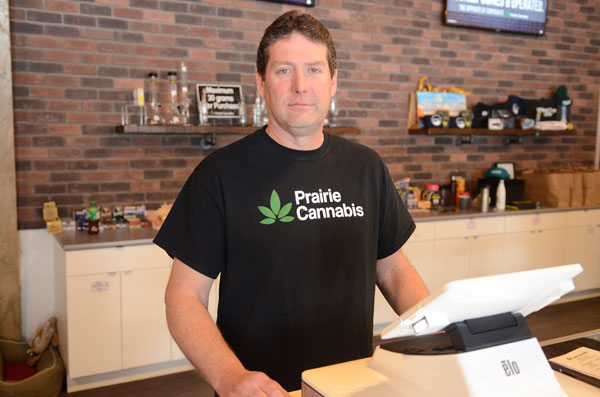
Prairie Cannabis owner says opening up the market is a premature move
Earlier this week, the provincial government announced it’s abandoning the cap on cannabis retail stores—and locals are shocked about the decision so early on in the industry.
The federal government legalized recreational cannabis in October 2018. Saskatchewan used a lottery system to determine who could open stores.
Prince Albert currently has two retail permits, belonging to Prairie Cannabis and Canaba. Both stores are located on Second Avenue East.
The Saskatchewan Liquor and Gaming Authority (SLGA) will now be opening up the retail market with a phase-in approach starting next year.
In April 2020, it will start accepting applications for cannabis retail permits in communities with populations of less than 2,500. Proponents will also be able to apply for permits in communities that were previously identified as eligible, but did not proceed.
Then, the following September, SLGA will begin accepting permit applications for stores from all communities across the province.
“We believe opening the market to more retailers will help meet customer demand while also helping discourage competition from unlicensed stores,” said minister responsible for Saskatchewan Liquor and Gaming Authority (SLGA), Gene Makowsky, in a news release.
Prairie Cannabis owner Jim Southam disagrees that it will deter people from turning to the black market.
“The people supporting the black market are supporting it for a reason,” he said.
“We’re going to have to change many other things in the legal industry in order to bring that segment into the legal cannabis sales market,” he said, such as having Health Canada license more micro-growers and bringing them into the legal market.
“We’re still in quite early days into the industry and that’s, to most of us I think, more stores has been the last thing on our minds.”
Ultimately though, Southam knew the day would come—just not so soon.
“We knew it was inevitable some day that we’d have more stores,” he said, but “We don’t have enough of the market yet of the legal sales compared to the total sales to increase.”
The City of Prince Albert doesn’t allow more than one cannabis store within a 500-metre radius, putting Southam at ease as he looks into the future of his business.
“There’s maybe one, maybe two possible locations for a store,” said Southam. “It’s not like we’re going to have 20 stores next year in Prince Albert.”
Although, Southam said the change may reduce their ability to open new stores because it can create room for large corporations.
“Some of the other independents were quite upset that by opening it wide open, it devalues our stores; it possibly decreases our potential revenue.”
“Who I feel sorry for is the local independent owners who did the system the way it was, went through the lottery, got their license,” echoed Mayor Greg Dionne.
He didn’t think the open market would put more work on the city because he’s happy with having two stores in Prince Albert.
With the federal government introducing legal edibles to the market, Dionne said “it’s just a big confusion” because stores already don’t have enough supply.
“I was caught off guard. They (the government) still haven’t figured out how to do the first (system), so maybe that’s why they’re leaving it. And I was kind of surprised because they’re going to still have to be licensed, but they put it on to the municipalities on how many you want, how many you’re going to allow or even opt out of having any. So it’s going to be an interesting six months.”
Supply for permitted retailers must still come from permitted wholesalers and federally licensed producers registered in Saskatchewan.
Businesses interested in applying will still have to meet SLGA’s permitting requirements, including a good character check, inventory tracking and store security, as well as local municipality requirements.
— with files from Peter Lozinski

